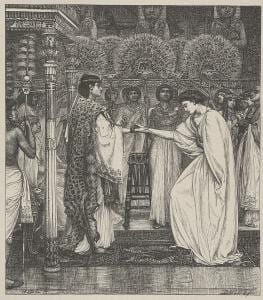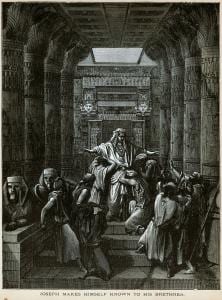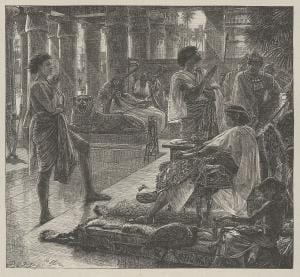 The tale of Joseph among his brothers has been called a biblical novella. That title may seem a bit pretentious, given that the story is a mere 14 chapters long; it could easily be read in less than an hour. Still, by biblical narrative standards it is quite a long story and possesses a rich plot, excellent characterizations, and irony and complexity aplenty to keep the most careful reader deeply engaged. After all, Thomas Mann, one of the great novelists of the last century, was able to milk nearly 1500 pages from the tale in his own retelling, Joseph and His Brothers. All the more reason for significant disappointment when one realizes how simplistically the story has been evaluated over the centuries of Christian reading.
The tale of Joseph among his brothers has been called a biblical novella. That title may seem a bit pretentious, given that the story is a mere 14 chapters long; it could easily be read in less than an hour. Still, by biblical narrative standards it is quite a long story and possesses a rich plot, excellent characterizations, and irony and complexity aplenty to keep the most careful reader deeply engaged. After all, Thomas Mann, one of the great novelists of the last century, was able to milk nearly 1500 pages from the tale in his own retelling, Joseph and His Brothers. All the more reason for significant disappointment when one realizes how simplistically the story has been evaluated over the centuries of Christian reading.
In too many of those interpretations, after noting that Joseph is a tad arrogant and condescending toward his brothers and his father at the story’s beginning, later, after his dizzying ascent to power in pharaoh’s Egypt, he becomes quite different, caring solicitously for his starving family, and giving God all the credit for his rescue from their hands and for the salvation of the family and Israel. In short, Joseph is for these readers a paragon of the ethical and wise person, unlike his Israelite forebears, especially Abraham and Jacob, known for their rascally ways. On the contrary, one should be like the amazing Joseph!
I could not disagree more. It is my judgment that the arrogant Joseph of Gen.37 is the same arrogant Joseph of Gen.45 and 50. What has changed is the power of the man, not the basic character. And because that is true, Joseph, far from being different than the characters that preceded him, is all too like them. Thus, the biblical theme of God’s unlikely choices continues unabated, and we can continue to say that the Bible does not ask us to be like its various figures; rather it asks now that you see that you are precisely like them, what do you, and God, propose to do about it?
It is easy enough to call the Joseph of Gen.37 what he so obviously is; a pompous, conniving little twit! Not only does he serve as daddy’s spy against his brothers (Gen.37:2), not only does old Dad make for his favorite a “long-sleeved robe,” a very expensive garment in a hand-to-mouth sheepherding culture (Gen.37:3), but the conceited brat even has dreams that place him far above both brothers and father in power and grandeur (Gen.37:5-11), and simply cannot wait to tell all them about them! By so doing, he has allowed his pomposity to outstrip whatever wisdom he might possess; he would have been very wise to keep those dreams to himself, because as a result of his sharing, the brothers plot to kill him; who could blame them!
But instead of murder, the furious brothers determine to throw nasty Joseph into a deep well, and since there is no water in the well, they assume he will die of slow starvation rather than drown. However, some passing traders pull Joseph from the well, and since they are on their way to Egypt, decide to drag the boy along, hoping to make some cash by selling him into slavery. And so they do, selling him to the powerful Potiphar, a high official in pharaoh’s household. But Joseph, being one of those golden ones, soon ends up being head of Potiphar’s own house, thereby catching the eye of a lusty Ms. Potiphar, who soon demands that the comely Hebrew join her in the connubial bed. Joseph refuses, and readers of the story here again make him out to be ethically beyond reproach. Again, I must disagree. Listen carefully to how Joseph responds to the wife’s very direct demand that he “lie with her.” “Look! With me here, my master has no concern with anything in the house, and has placed everything that he has in my hands. He is not greater in the house than I am, nor has he kept back anything from me—except you, because you are his wife. How then could I do this great wickedness, and sin against God” (Gen.39:8-9)? Note how this speech is structured, as he confronts the libidinous female who has just offered herself to him. He does not say, “Oh, I could never do such a terrible thing, because God forbids it!” He first says, “I have all the power in this house; even Potiphar, your husband, does not have more power than I. Why, he has given me full control of everything here, save you, my dear, since you are his wife.” Note how he is careful to apprise her of the reality of his great power, implying that he could very well have her, but he refrains from exercising that power. Finally, at speech’s end, he gets to God, but it takes him a very long time to arrive there. He must first recount just how grand he is. There is the real Joseph.
 And so it is in this very famous story of Joseph’s revelation of himself to his brothers in our text for today. The context of this speech is crucial for a full understanding. Joseph has spent much of the preceding three chapters playing what may only be called a cruel game with his brothers. Joseph has risen to vast power in Egypt; he is nothing less than pharaoh’s right hand, given the power of life and death in the land. His brothers, starving in Israel due to famine, have come to the breadbasket of the ancient world, the fertile black land of Egypt, to buy grain. As it happens, they are ushered into the presence of the mighty vizier of Egypt, the very Joseph of our story. He immediately recognizes them, but they, of course, have not a clue who it is they are facing. After all, to them, the tattle-tailing Joseph is long dead in that desert well.
And so it is in this very famous story of Joseph’s revelation of himself to his brothers in our text for today. The context of this speech is crucial for a full understanding. Joseph has spent much of the preceding three chapters playing what may only be called a cruel game with his brothers. Joseph has risen to vast power in Egypt; he is nothing less than pharaoh’s right hand, given the power of life and death in the land. His brothers, starving in Israel due to famine, have come to the breadbasket of the ancient world, the fertile black land of Egypt, to buy grain. As it happens, they are ushered into the presence of the mighty vizier of Egypt, the very Joseph of our story. He immediately recognizes them, but they, of course, have not a clue who it is they are facing. After all, to them, the tattle-tailing Joseph is long dead in that desert well.
To make the ruse work to perfection, Joseph uses an interpreter who hears the brother’s Hebrew, and in turn translates it into the mighty man’s Egyptian. Of course, Joseph understands their every Hebrew word, and knows all too well that his pathetic siblings have only come to stave off starvation. Nevertheless, the grandiose vizier accuses them of spying out the land for later attack, and begins thereby a lengthy game of cat and mouse, demanding that one of them remain in prison while the rest return to their land, and then putting the payment for their grain purchase back into their saddlebags—and then calling them thieves when a servant discovers the money! Later, the puppet-master Joseph demands to see their youngest brother, Benjamin, or none of them will survive. Soon, Joseph hides his special magical cup in Benjamin’s baggage, and accuses him of theft when it is discovered, threatening all of them with death.
Then, and only then, does Joseph reveal himself to his brothers, saying, “I am Joseph. Is my father still alive” (Gen.45:3)? After that long and cruel game, it is more than a simple question to ask; just how could an old man survive the wily twists and turns of a monstrous son, whom he thought long dead? The brothers’ reaction to the revelation is noteworthy: “His brothers could not answer him, so astonished were they at hipresence” (Gen.45:3b). One can only imagine the plethora of thoughts that surged through the brothers as they looked in complete shock at their brother, now become the vizier of all Egypt. Joseph? That little jerk? We knew he was dead! But then they may have turned to the terrible series of tricks he has played on them over the past months; money in the sacks, the demand to see their brother, the magic cup in his sack, the threat of death hanging over all of them—all lies, all tricks. Given that portrait of the brothers, try now to listen to Joseph’s speech.
“I am your brother, Joseph, whom you sold into Egypt. And now do not be upset (really!?), or angry with yourselves, because you sold me here; for God sent me before you to preserve life…It was not you who sent me here, but God who has made me father to pharaoh (really!?), and lord of all his house (really!?) and ruler over all the land of Egypt (really!?). Tell my father, ‘ God has made me lord of all Egypt’” (Gen.45:4-9). Joseph simply could not resist having the brothers repeat in Jacob’s ears that clear exaggeration that Joseph has been made “lord of all Egypt.” There is only one lord of all Egypt, and it plainly is not Joseph.
Joseph goes on to announce that he will take care of them all, including their father (Gen.45:10-11), because it is he, Joseph, arrogant, self-possessed, conceited Joseph, who will do all, because he it is who has the power to do all. And to make it certain that Joseph is as great as he says, once more he charges the brothers not to forget to “tell my father how greatly I am honored in Egypt” (Gen.45:13). This is arrogance personified!
And if he thinks that this grandiose speech can wipe away the terror and fury he has aroused in his brothers, he is sadly mistaken, because at the end of the entire story, his brothers are still terrified that their vengeful sibling will still look for ways to get even with them for what they did to him in the desert. And so they are driven to lie, using their dead father in the untruth. “Joseph,” they whine, “Dad said before he died that you should forgive us for what we did to you” (Gen.50:16-17). Jacob said nothing of that. And when Joseph hears that from his brothers, he weeps, and I think his weeping is his realization that all of his talk of caring for them, of his saving of them, has finally meant nothing to them. They still see him as exactly who he is: an arrogant man attempting to control all things through his inflated sense of himself. The Joseph of Gen.37 is still the Joseph of Gen.50.
Arrogance and conceit are tricky things. The fact that so many readers of this story have failed to see Joseph in this light suggests that arrogance can at times be rather more a hidden characteristic than an overt one. Each of us needs to look very carefully at ourselves as we assess the ultimate reasons for our behaviors toward our colleagues to see whether in fact a hidden conceit might be motivating us as much as a sense for genuine care and concern for them. I find the Joseph story a cautionary tale far more than an exemplary one. It forces us to look more closely at ourselves, helping us to root out those hidden motivations that may spring from arrogance and conceit. As usual, the Bible can help us see something more of ourselves than we may be able to see on our own.
(Images from Wikimedia Commons)















